
A comic strip is a sequence of cartoons, arranged in interrelated panels to display brief humor or form a narrative, often serialized, with text in balloons and captions. Traditionally, throughout the 20th and into the 21st century, these have been published in newspapers and magazines, with daily horizontal strips printed in black-and-white in newspapers, while Sunday papers offered longer sequences in special color comics sections. With the advent of the internet, online comic strips began to appear as webcomics.

Breakfast cereal is a breakfast food made from processed cereal grains. It is traditionally eaten as part of breakfast, or a snack food, primarily in Western societies.
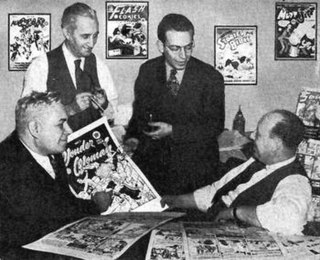
Maxwell Charles Gaines was an American publisher and a pioneering figure in the creation of the modern comic book.

Cheerios is a brand of cereal manufactured by General Mills in the United States and Canada, consisting of pulverized oats in the shape of a solid torus. In some countries, including the United Kingdom, Cheerios is marketed by Cereal Partners under the Nestlé brand; in Australia and New Zealand, Cheerios is sold as an Uncle Tobys product. It was first manufactured in 1941 as CheeriOats.
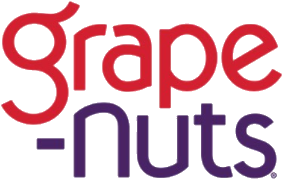
Grape-Nuts is a brand of breakfast cereal made from flour, salt and dried yeast, developed in 1897 by C. W. Post, a former patient and later competitor of the 19th-century breakfast food innovator Dr. John Harvey Kellogg. Post's original product was baked as a rigid sheet, then broken into pieces and run through a coffee grinder.

Chex is an American brand of breakfast cereal currently manufactured by General Mills. It was originally known as Shredded Ralston, first produced in 1936 and owned by Ralston Purina of St. Louis, Missouri, then later renamed Chex in 1950. The Chex brand went with corporate spinoff Ralcorp in 1994 and was then sold to General Mills in 1997. Rival cereal company Kellogg's has the rights to the Chex brand in South Korea and Singapore.
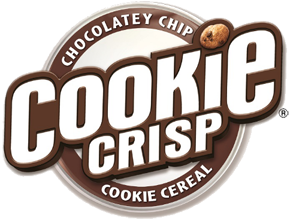
Cookie Crisp is a breakfast cereal that is manufactured to look like chocolate chip cookies. It is produced by General Mills in the United States and Cereal Partners in other countries. Introduced in 1977, it was originally produced by Ralston Purina until they sold the trademark to General Mills in 1997.
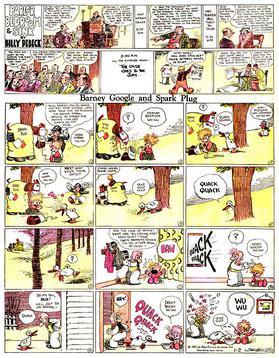
The Sunday comics or Sunday strip is the comic strip section carried in most Western newspapers. Compared to weekday comics, Sunday comics tend to be full pages and are in color. Many newspaper readers called this section the Sunday funnies, the funny papers or simply the funnies.
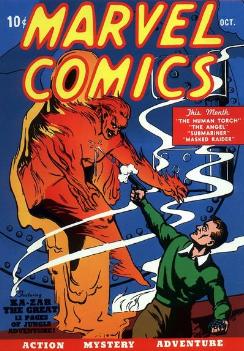
Funnies, Inc. was an American comic book packager of the late 1930s to 1940s period collectors and historians call the Golden Age of Comic Books. Founded by Lloyd Jacquet, it supplied the contents of early comics, including that of Marvel Comics #1, the first publication of what would become the multimedia corporation Marvel Comics.

Chex Mix is a type of snack mix that includes Chex breakfast cereal as a major component.

Motion Picture Funnies Weekly is a 36-page American comic book created in 1939, and designed to be a promotional giveaway in movie theaters. While the idea proved unsuccessful, and only a handful of sample copies of issue #1 were printed, the periodical is historically important for introducing the enduring Marvel Comics character Namor the Sub-Mariner, created by writer-artist Bill Everett.
The Eastern Color Printing Company was a company that published comic books, beginning in 1933. At first, it was only newspaper comic strip reprints, but later on, original material was published. Eastern Color Printing was incorporated in 1928, and soon became successful by printing color newspaper sections for several New England and New York papers. Eastern is most notable for its production of Funnies on Parade and Famous Funnies, two publications that gave birth to the American comic book industry.

Saturday Morning Breakfast Cereal (SMBC) is a webcomic by Zach Weinersmith. The gag-a-day comic features few recurring characters or storylines, and has no set format; some strips may be a single panel, while others may go on for ten panels or more. Recurring themes in SMBC include science, research, superheroes, religion, romance, dating, parenting and the meaning of life. SMBC has run since 2002 and is published daily.

Wheatena is an American high-fiber, toasted-wheat cereal that originated on Mulberry Street in New York City, New York, c. 1879, when a small bakery owner began roasting whole wheat, grinding it, and packaging it for sale under this brand name.

Zachary Alexander Weinersmith is an American cartoonist and writer, best known for his webcomic Saturday Morning Breakfast Cereal (SMBC). Outside of SMBC, he has worked on a sketch comedy series, a podcast, and multiple other webcomics. With his wife Kelly Weinersmith, he has co-authored the 2017 book Soonish and the 2023 book A City on Mars. He illustrated the 2019 book Open Borders by economist Bryan Caplan, and wrote the 2023 children's book Bea Wolf, a loose adaptation of Beowulf.
Stan Mack is an American cartoonist, illustrator and author best known for his observational comic strip Stan Mack's Real Life Funnies, which ran in The Village Voice for more than 20 years. He was an early pioneer of documentary cartooning and is the author of numerous graphic nonfiction books addressing a wide range of social and historical topics.
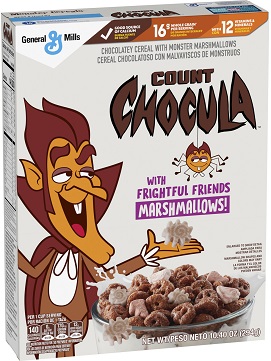
The monster cereals are a line of breakfast cereals produced by General Mills Corporation in North America. The line was introduced in 1971 and, at various times, has included six brands, each featuring a cartoon version of a classic movie monster: Count Chocula, Franken Berry, and Boo Berry, as well as Frute Brute and Fruity Yummy Mummy with a sixth character Carmella Creeper introduced in 2023.

Ralcorp Holdings is a manufacturer of various food products, including breakfast cereal, cookies, crackers, chocolate, snack foods, mayonnaise, pasta, and peanut butter. The company is based in St. Louis, Missouri. The majority of the items Ralcorp makes are private-label, store-brand products. It has over 9,000 employees. Ralcorp has its headquarters in the Bank of America Plaza in downtown St. Louis.
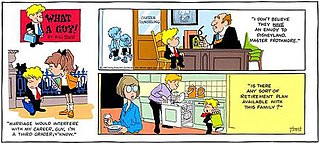
What a Guy! is an American comic strip created by Bill Hoest and Bunny Hoest, the team responsible for The Lockhorns and Agatha Crumm. It began in March 1987, just over a year before Hoest's death in 1988.
The Sunday Funnies is a publication reprinting vintage Sunday comic strips at a large size (16"x22") in color. The format is similar to that traditionally used by newspapers to publish color comics, yet instead of newsprint, it is printed on a quality, non-glossy, 60-pound offset stock for clarity and longevity. Featured are classic American comic strips from the late 19th century to the 1930s. The publication's title is taken from the generic label often used for the color comics sections of Sunday newspapers.

















